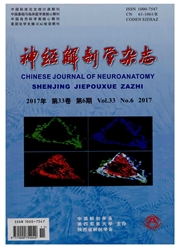

 中文摘要:
中文摘要:
采用每周一个周期的Morris水迷宫(MWM)训练(包括第1d的定位航行实验和第2d的空间探索实验),探讨重复MWM训练对大鼠空间学习、记忆能力的影响。在定位航行实验中,动物随机从不同象限连续入水5次以寻找隐藏站台,测量其上台潜伏期来评定其空间学习能力;在第二个训练日中,空间探索实验时撤去隐藏在靶象限的站台,计算大鼠在靶象限活动时间的百分比,评定大鼠的空间记忆能力。采用雄性SD大鼠20只,连续四周重复给予MWM定位航行和探索训练,分别评定大鼠空间学习和记忆能力。结果显示:随着训练次数的增加,动物的上台潜伏期逐渐缩短。同时,第一次的MWM训练能够提高大鼠的空间记忆能力.然而重复训练则轻微提高大鼠的空间记忆能力,但无统计学差异:在1、2、3、4周测得的靶象限内活动时间百分比分别为39、29%±1.62%,39、97%±2.34%,42.05%±2.32%,39.30%±1.64%。本实验结果提示:重复MWM定位航行能够增强动物的空间学习能力,但不影响动物的空间记忆能力。空间学习和记忆能力可能存在不同的形成机制。
 英文摘要:
英文摘要:
To observe the effects of repeated Morris water maze (MWM) training on the spatial learning and memory abilities of rats, the navigation test and probe test were employed every week. In the navigation test, the spatial learning ability was evaluated with the averaged escape latencies to the plate when the animals were located randomly into the swimming pool for 5 times on the first training day. The spatial memory ability was evaluated by using the ratio of time spent in the target quadrant in the probe test on the second training day. Twenty male SD rats were trained. We used the repeated MWM training on the navigation test and probe test to evaluate the spatial learning or memory abilities of rats for 4 consecutive weeks respectively. The results showed that the escape latencies decreased along with the repeated MWM training. The first MWM training can induce spatial memory in the probe test while repeated MWM training induced slight and insignificant increase of spatial memory. The ratios of time spent in the target quadrant for the first, second, third and fourth week were 39. 29% ± 1.62%, 39.97%±2.34%, 42.05%±2.32%, 39.30%± 1.64%, respectively. MWM training can help rats obtain spatial memory ability. The results indicate that repeated MWM training can increase the spatial learning ability but can not affect the spatial memory ability, and the spatial learning and memory may have different mechanisms.
 同期刊论文项目
同期刊论文项目
 同项目期刊论文
同项目期刊论文
 Quetiapine Ameliorates Anxiety-like Behavior and Cognitive Impairments in Stressed Rats: Implication
Quetiapine Ameliorates Anxiety-like Behavior and Cognitive Impairments in Stressed Rats: Implication 期刊信息
期刊信息
